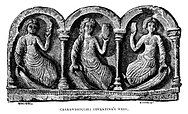Our website is made possible by displaying online advertisements to our visitors.
Please consider supporting us by disabling your ad blocker.
Ancient Celtic religion
| Part of a series on |
| Celtic mythologies |
|---|
 |

Ancient Celtic religion, commonly known as Celtic paganism,[1][2][3] was the religion of the ancient Celtic peoples of Europe. Because there are no extant native records of their beliefs, evidence about their religion is gleaned from archaeology, Greco-Roman accounts (some of them hostile and probably not well-informed), and literature from the early Christian period.[4] Celtic paganism was one of a larger group of polytheistic Indo-European religions of Iron Age Europe.
While the specific deities worshipped varied by region and over time, underlying this were broad similarities[5] in both deities[6] and "a basic religious homogeneity" among the Celtic peoples.[7] Widely worshipped Celtic gods included Lugus, Toutatis, Taranis, Cernunnos, Epona, Maponos, Belenos, Ogmios, and Sucellos.[6][4] Sacred springs were often associated with Celtic healing deities.[8] Triplicity is a common theme, with a number of deities seen as threefold, for example the Three Mothers.
The druids were the priests of Celtic religion, but little is definitively known about them.[9] Greco-Roman writers stated that the Celts held ceremonies in sacred groves and other natural shrines, called nemetons, while some Celtic peoples also built temples or ritual enclosures.[6] Celtic peoples often made votive offerings which would be deposited in water and wetlands, or in ritual shafts and wells.[6] There is evidence that ancient Celtic peoples sacrificed animals, almost always livestock or working animals.[10] There is some evidence that ancient Celts sacrificed humans, and Caesar in his accounts of the Gallic wars claims that the Gauls sacrificed criminals by burning them in a wicker man, though this may have been imperial propaganda.[11]
- ^ Ross 1974[page needed]
- ^ Hutton 1991[page needed]
- ^ Jones, Prudence and Pennick, Nigel (1995). A History of Pagan Europe. Routledge.
- ^ a b Green, Miranda (2012). "Chapter 25: The Gods and the supernatural", The Celtic World. Routledge. pp.465–485
- ^ Cunliffe 1997, p. 184
- ^ a b c d Cunliffe 1997, pp. 275–277, 286, 291–296
- ^ Ross 1986, p. 103
- ^ Koch 2006, pp. 1488–1491
- ^ Hutton 2009, p. 17
- ^ Cite error: The named reference
Green94-96was invoked but never defined (see the help page). - ^ Cite error: The named reference
koch687-690was invoked but never defined (see the help page).
Previous Page Next Page


